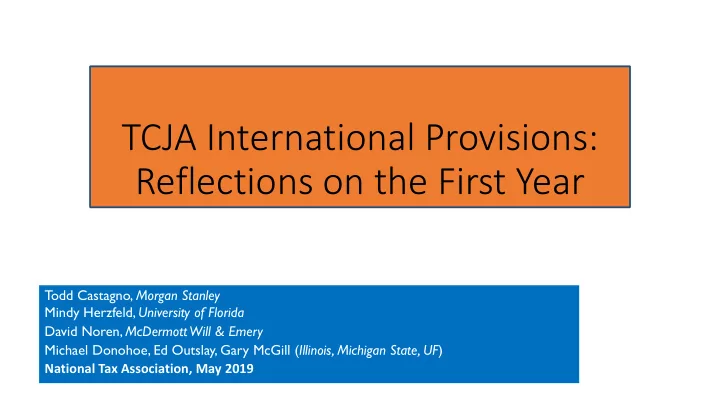

TCJA International Provisions: Reflections on the First Year T odd Castagno, Morgan Stanley Mindy Herzfeld, University of Florida David Noren, McDermott Will & Emery Michael Donohoe, Ed Outslay, Gary McGill ( Illinois, Michigan State, UF ) National Tax Association, May 2019
Behavioral Responses: Practitioner’s Perspective May 16, 2019 2
A practitioner’s perspective • Most planning is still very preliminary; companies will start making any major changes once we have a comprehensive set of final regulations • Even then, there are real concerns about the stability of TCJA, and thus most planning will require “off ramps” • Democrats’ emerging approach to TCJA in the new Congress • Broader political uncertainty and turbulence • New expiring provisions • Grim budget outlook • Impact of developments outside the US • For all of the unprecedented complexity and uncertainty companies are dealing with now, there is also a sense that this is as good as we’re ever going to have it…. May 16, 2019 3
A practitioner’s perspective, cont’d • At a high level, TCJA got a lot right • Broadened base • Lowered rate • Addressed income shifting • Addressed lock-out effect (although PTEP planning turns out to be more of an adventure than anticipated) • IP location and supply chain planning is more complex than ever, due to the proliferation of plausible alternatives to the standard pre-TCJA planning • GILTI – FDII comparison • BEAT impacts • Foreign branches • Practicalities of US IP onshoring • Practicalities of foreign-to-foreign IP onshoring • New limits on IP outbounding May 16, 2019 4
A practitioner’s perspective, cont’d FDI FDII GILTI on on zer ero-ra rate IP IP 13.125% 10.5% or 0% or other 16.406% (starting in 2026) 13.125% (starting in 2026) or 0% or other WTO challenge N/A FDII documentation complexity N/A US use of IP disqualifying for lower rate US use of IP not disqualifying for lower rate QBAI unfavorable attribute QBAI favorable attribute May 16, 2019 5
A practitioner’s perspective, cont’d • DEMPE alignment • Tax attributes—e.g., excess credits in general basket • Public/government relations • BEAT considerations—inbounding may increase US base but potentially increase outbound related party payments (e.g., R&D) May 16, 2019 6
Recommend
More recommend